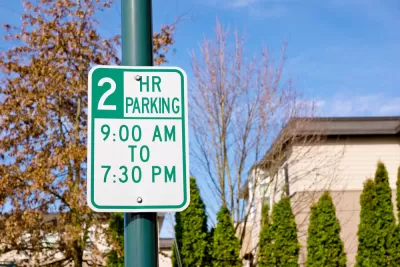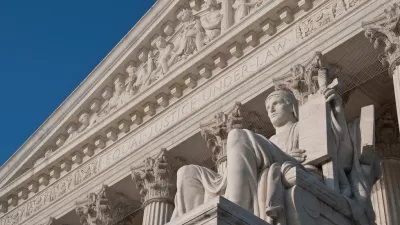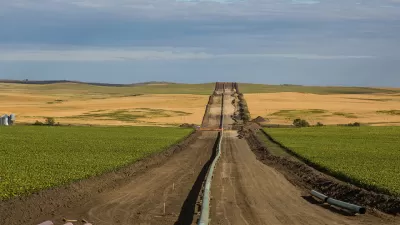A unanimous ruling by a three-judge panel of the U.S. Sixth Circuit Court of Appeals on April 22 found that the chalking of tires by parking enforcement officers on public streets is a violation of the Fourth Amendment.

"Chalking violates the Fourth Amendment’s ban on unreasonable searches and seizures, the Sixth Circuit Court of Appeals judges said, reversing a lower court’s decision to dismiss the suit and sending it back for trial instead," reports Campbell Robertson for The New York Times.
CNN: At 1:15 minutes, Michael Smerconish asks the plaintiff's attorney how chalking constitutes a "search."
Two clever lawyers in Saginaw, Mich., saw a connection between chalking tires and a 2012 Supreme Court decision, United States v. Jones, which involved a GPS tracker that the police had secretly attached to Antoine Jones' car without obtaining a valid warrant, explains Robertson.
... Justice Antonin Scalia, writing for the five-justice majority, held that the heart of the matter was the physical placement of a device on Mr. Jones’s “private property, for the purpose of obtaining information.” It was this “government trespass,” he wrote, that made the use of the tracker without a warrant an unconstitutional search.
The Saginaw case, "Alison Patricia Taylor, Plaintiff-Appellant vs. City of Saginaw; Tabetha Hoskins, Defendants-Appellees [pdf]," was initially heard on April 5, 2017, by the U.S. District Court for the Eastern District of Michigan in Bay City. Appeals court Judge Bernice Donald wrote for the panel, surprisingly showing some humor in the use of a pun:
Alison Taylor, a frequent recipient of parking tickets, sued the City and its parking enforcement officer Tabitha Hoskins, alleging that chalking violated her Fourth Amendment right to be free from unreasonable search. The City moved to dismiss the action. The district court granted the City’s motion, finding that, while chalking may have constituted a search under the Fourth Amendment, the search was reasonable.
Because we chalk this practice up to a regulatory exercise, rather than a community-caretaking function, we REVERSE.
The 10-page court decision answers two questions: Does chalking constitute "a search within the meaning of the Fourth Amendment; and second, whether the search was reasonable."
"Among other legal rationales, the [trial] judge found that the police have the authority to enforce parking regulations, even to tow cars, as an exercise of “community caretaking," writes Robertson.
The Sixth Circuit judges disagreed, finding that the enforcement of a two-hour parking limit was not a matter of public safety, but simply a way of raising revenue. Nor, they said, was there any probable cause to justify the search, since the chalk marks are made on cars that, at that time, are still legally parked.
This correspondent finds some irony in basing the appeal on the Jones case as chalking couldn't be more different than employing GPS technology. As the plaintiff herself noted, "There should be a better way to track this, ... What if it’s raining one day?”
Possible implications for "free parking"
No doubt more modern methods utilizing technology will be considered in lieu of chalk, as UCLA urban planning Professor Donald Shoup told Robertson.
Though officers these days may also take time-stamped photographs to document the infraction, “chalking tires is very old-fashioned,” said Shoup. “The first references I’ve seen to it were in the 1920s.”
Every city with a parking ordinance probably used chalking at one time, Professor Shoup said, but the practice is becoming less common, replaced by computerized meters, pay-by-phone apps and digital vehicle recognition systems, including one called autoChalk.
However, it should be noted that the first two methods Shoup mentioned apply to priced parking.
Alison Taylor, the plaintiff who worked at a local newspaper, chose to park on the street or a public lot where parking was unmetered but limited to two hours, as opposed to an all-day lot, also unpriced, reports Matthew S. Schwartz for NPR.
"We don't think everyone deserves free parking," Taylor's lawyer, Philip Ellison, told The Associated Press. "But the process Saginaw selected is unconstitutional. ... I'm very glad the three judges who got this case took it seriously. It affects so many people."
Had street parking been metered, it is possible that Ms. Hoskins and other parking enforcement officers would need only check the meters or pay stations to see if violations had occurred. This nexus of chalking to unpriced parking was noted by Suzanne Maxwell, director of the Bay City Downtown Development Authority, where the trial court is located. Robertson of the Times writes:
Bay City is working on an alternative to chalking, said Maxwell, but in the meantime, it has no procedure for enforcing time limits in free spots downtown.
"It is unclear what will happen now in the wake of the decision, which is binding in the four states covered by the Sixth Circuit — Michigan, Ohio, Kentucky and Tennessee," adds Robertson.
Hat tip to Michael Smerconish (CNN).
FULL STORY: Lose the Chalk, Officer: Court Finds Marking Tires of Parked Cars Unconstitutional

Alabama: Trump Terminates Settlements for Black Communities Harmed By Raw Sewage
Trump deemed the landmark civil rights agreement “illegal DEI and environmental justice policy.”

Planetizen Federal Action Tracker
A weekly monitor of how Trump’s orders and actions are impacting planners and planning in America.

How Atlanta Built 7,000 Housing Units in 3 Years
The city’s comprehensive, neighborhood-focused housing strategy focuses on identifying properties and land that can be repurposed for housing and encouraging development in underserved neighborhoods.

In Both Crashes and Crime, Public Transportation is Far Safer than Driving
Contrary to popular assumptions, public transportation has far lower crash and crime rates than automobile travel. For safer communities, improve and encourage transit travel.

Report: Zoning Reforms Should Complement Nashville’s Ambitious Transit Plan
Without reform, restrictive zoning codes will limit the impact of the city’s planned transit expansion and could exclude some of the residents who depend on transit the most.

Judge Orders Release of Frozen IRA, IIJA Funding
The decision is a victory for environmental groups who charged that freezing funds for critical infrastructure and disaster response programs caused “real and irreparable harm” to communities.
Urban Design for Planners 1: Software Tools
This six-course series explores essential urban design concepts using open source software and equips planners with the tools they need to participate fully in the urban design process.
Planning for Universal Design
Learn the tools for implementing Universal Design in planning regulations.
Caltrans
Smith Gee Studio
Institute for Housing and Urban Development Studies (IHS)
City of Grandview
Harvard GSD Executive Education
Toledo-Lucas County Plan Commissions
Salt Lake City
NYU Wagner Graduate School of Public Service





























